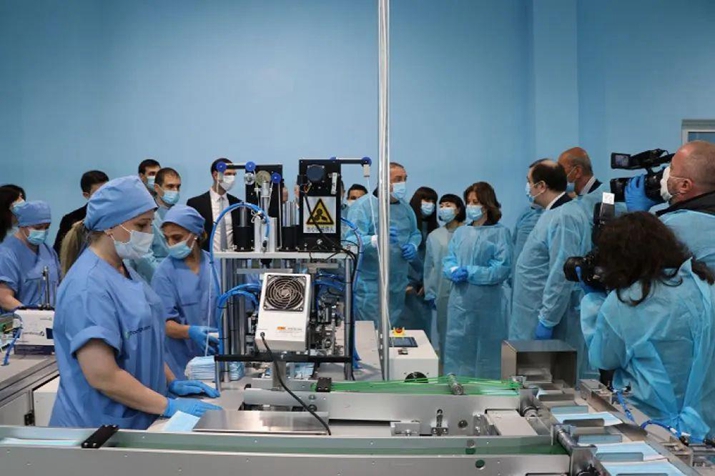| Voice |
| A Review of the "Changed" and "Unchanged" World Pattern after the COVID-19 Outbreak | |
|
|
|
The spread of COVID-19 has had major impacts on world economic operations, the global governance system and the international political pattern. However, from a comprehensive, dialectical and historical perspective, the essential nature of the interdependence of human society still exists, so the basic elements and objective laws of economic development cannot be completely changed by a single pandemic. We should have a holistic view and be far-sighted, review the overall relation change of the global geostrategic pattern, global governance modes and international relations actors in the near, medium and long term of the pandemic, take precautions and turn adversity into opportunity.
I. Coordinate epidemic prevention and control with economic development
At present, the global COVID-19 outbreak remains severe and the downward pressure on the world economy has not been relieved. However, the international community has gradually come to a consensus that epidemic prevention and control should be coordinated with economic and social development because they are interrelated and mutually reinforcing.
 On May 25, the first face mask production line imported from China went into operation in Tbilisi, the capital of Georgia
To fight the pandemic and build a community of common health for mankind. As a responsible great power, China is playing an active role in the global fight against COVID-19. In the future, we will expand international, regional and bilateral cooperation in the fight against COVID-19, and continue to maintain good communication and strong cooperation with the World Health Organization and relevant UN organizations.
We will ensure economic and social development. The pandemic is the maximum variable in the international economy. In recent years, many countries and regions have encountered the “three lows” problem; that is, low growth, low inflation and low interest rates. The COVID-19 outbreak will highlight all kinds of existing risks worldwide, severely damage the supply and demand of the global economy, have huge impacts on the industrial chain, and lead to the rapidly deteriorating international financial environment, which will increase the risk of a world economic recession or even an economic crisis.
Despite the complex and severe situation of global epidemic prevention and control, the huge challenges faced by the global economy and even the viewpoint that COVID-19 could permanently change the operation model of the global economy, the International Monetary Fund expects that the economies of several countries including China will show positive growth. The downturn in China and the US, the world’s largest economies, ultimately bottomed out in February and April, with such indicators as shipping, trade and stocks showing improvement. In addition, the economic and social situations of China, Japan, South Korea and Southeast Asia also show relatively positive trends. There is reason to believe that the “darkest hour” has passed or will soon pass in the Asia-Pacific Region.
II. Promote globalization and global governance
The pandemic has severely impacted economic globalization. As an important development trend and characteristic of the contemporary world economy, economic globalization promotes the transnational and trans-regional flow of production factors, stimulates division and cooperation among countries in the market, and makes the global economy become closely connected as a whole. Economic globalization is conducive to the rational allocation of resources and production factors in the world, but brings both opportunities and challenges as a “double-edged sword”.
The global supply chain, industrial chain and value chain have been greatly impacted. The pandemic has posed a major dilemma for economic globalization: interconnectivity is the essence of economic globalization, but we need to cut off human contact to prevent and fight the pandemic, which makes it more difficult for countries to govern. The pandemic has seriously impacted and affected economic globalization in the following three aspects: first, it has accelerated the adjustment of the international order and the globalization structure; second, some countries have become inward-oriented in their policies to reduce reliance on international supply chains; and third, some multinational enterprises have adjusted their global strategies to promote the localization and regionalization of the supply chain.
The global governance system has been seriously jeopardized. The pandemic has severely disrupted normal international economic and trade activities, badly hindered the cross-border flow of goods and services, and seriously impacted the global multilateral governance system. In terms of economic operation, the regional economic cooperation structure and supply & demand and production chains may require restructuring.
The salient problem is that the overall situation of the global economy may worsen due to unilateralism and protectionism. The United States Government prioritizes its own interests and attempts to replace international governance with autocracy. Political interference has soared while the normal functions of economic factors and markets have been severely disrupted. For example, the US national security strategy has identified China as its main strategic competitor and intensified its comprehensive strategic squeeze and containment of China. In order to shirk the responsibility for the poor response to the COVID-outbreak for domestic political reasons, some US politicians are bad-mouthing and “passing the buck to” China. They are ignoring economic laws, promoting US-China “decoupling” and trying to force industrial transfer to cut off the industrial chain with China.
In this regard, we must unequivocally advance globalization and global governance, be prepared for unexpected developments, plan for worst-case scenarios, take comprehensive measures and nip problems in the bud.
III. Unswervingly open up wider to the outside world
First, we must steadfastly “manage our own affairs well”. In April of this year, the Central Government made timely new arrangements according to changes in the domestic and international situations. In addition to ensuring “stability in employment, financial operations, foreign trade, foreign investment, domestic investment and expectations”, such new tasks as “ensuring security in employment, basic living needs, operations of market entities, food and energy security, stable industrial and supply chains, and the normal functioning of primary-level governments” have been proposed. A working framework of ensuring “stability in six areas” and “security in six areas” has been formed. After suffering short-term losses from COVID-19, China’s economy is returning to normal, with a stable prevention and control situation, and positive long-term development prospects; this shows that our system has the capacity to adjust, adapt and repair itself, and that China has the institutional advantage of concentrating our efforts to deal with important matters.
 On May 9th in the exhibition area of an enterprise in the Zizhu National Hi-Tech Industrial Development Park of Minhang District, Shanghai, an employee was introducing application cases of "AI+ New Retail" in the retail industry
The “troika” of investment, consumption and export driving China’s economic growth has begun to coordinate: “new infrastructure construction” investment is an important measure of China’s macro-control; considering the impact of the pandemic on employment and the negative impact on consumer psychology, efforts should be made to promote consumption growth to meet market expectations in the post-COVID-19 era; and the greatest difficulty may lie in expanding exports. Even if China’s export sector resumes first, it needs to address the shortage of international orders.
The NPC and CPPCC advocate the following: we should unswervingly open up wider to the outside world, stabilize the industrial and supply chains, and promote reform and development through opening up. This has undoubtedly boosted confidence in the economic and social development of China and the world. Practice has proven that the achievements of China’s economic development over the past 40 years were made possible by opening-up. The high-quality development of China’s economy in the future will also be achieved through greater openness. In the post-COVID-19 era, China’s basic policies will remain the same: opening up wider to the outside world, balancing both domestic and international interests, and becoming an advocate, practitioner and promoter of a new type of economic globalization.
“Warm and Cold, We Share Together.” The pandemic has profoundly enlightened the public: in the era of globalization, the members of the global village are intertwined and share a common destiny. Therefore, it is the only correct direction for the development of human society to build a community of shared future for mankind. We live in an era when traditional and non-traditional security issues are intertwined. China and the international community will enhance their mutual trust, implement the new concept of common, comprehensive, cooperative and sustainable security, and promote the construction of international mechanisms for addressing non-traditional security threats. The international community must strengthen its coordination and cooperation, increase the priority of public health security on the international agenda and improve mechanisms for global public health governance, thereby jointly building a community of common health for mankind.
The author is a member of the Academic Committee of the Institute for Global Cooperation and Understanding (iGCU) with Peking University, former President of China Institute of International Studies, former China's Ambassador to Iceland
|
|
||||||||||||||||||||||||||||||
|
